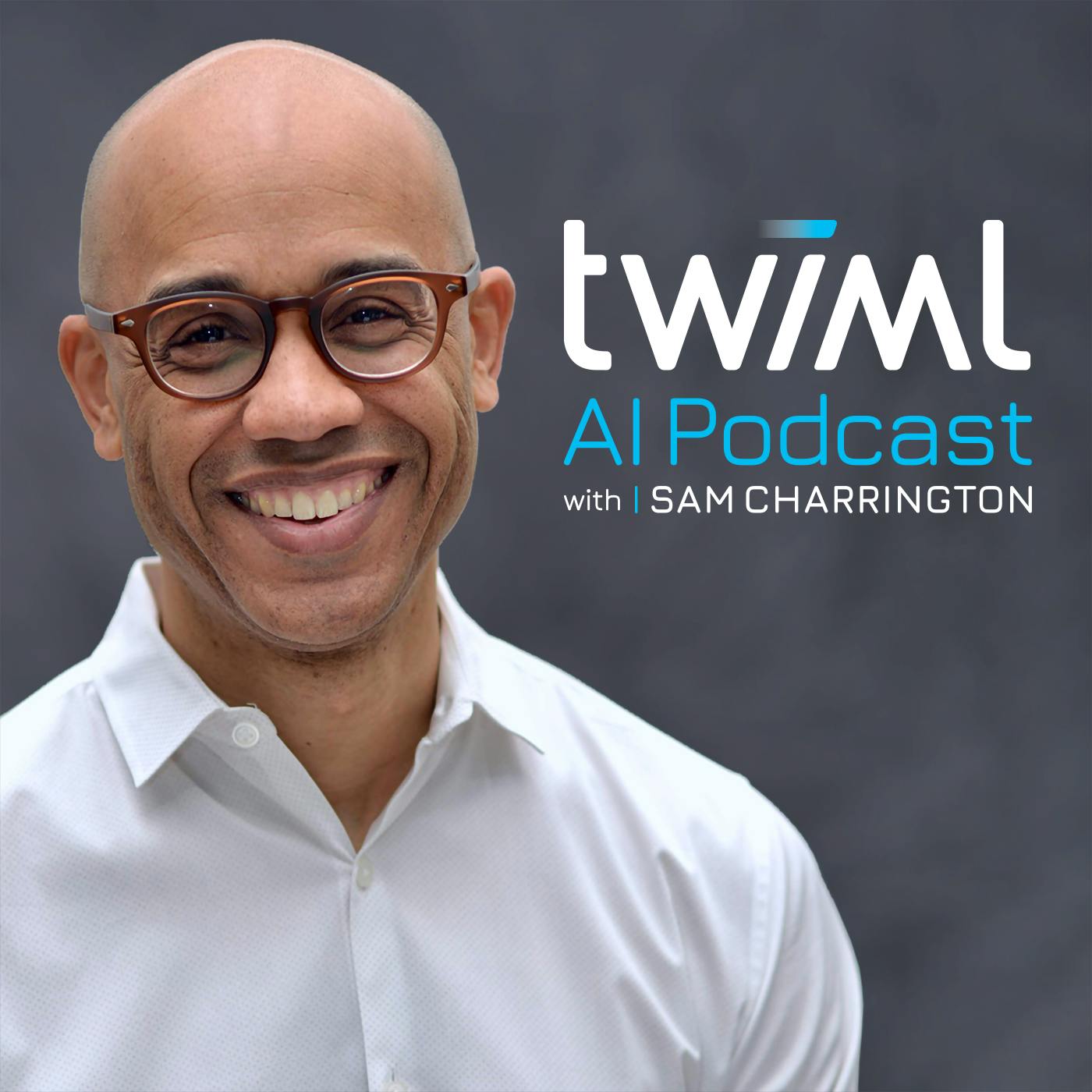
780 episodes
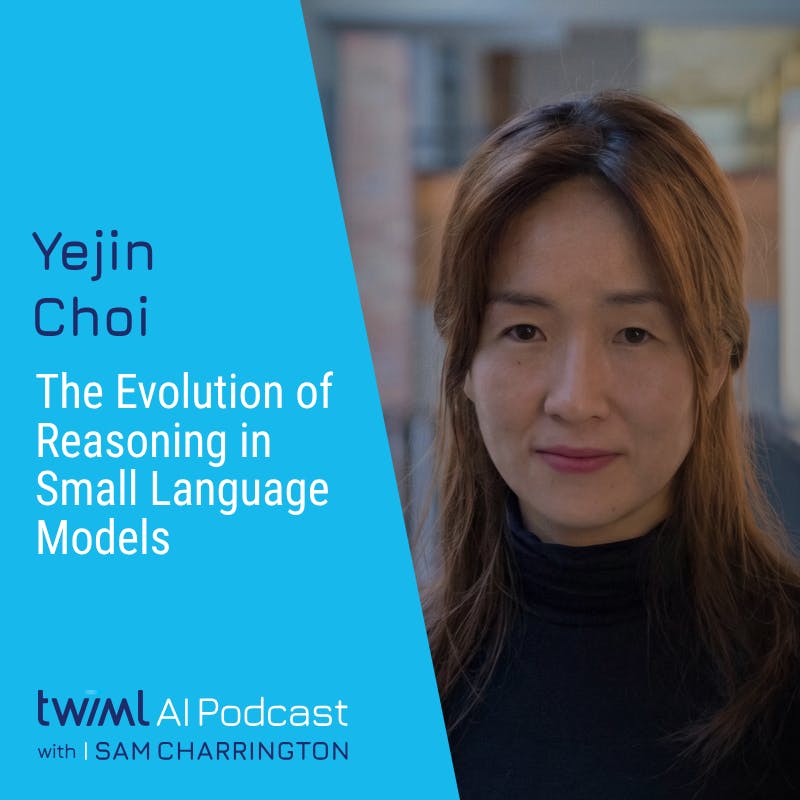

Today, we're joined by Yejin Choi, professor and senior fellow at Stanford University in the Computer Science Department and the Institute for Human-Centered AI (HAI). In this conversation, we explore Yejin’s recent work on making small language models reason more effectively. We discuss how high-quality, diverse data plays a central role in closing the intelligence gap between small and large models, and how combining synthetic data generation, imitation learning, and reinforcement learning can unlock stronger reasoning capabilities in smaller models. Yejin explains the risks of homogeneity in model outputs and mode collapse highlighted in her “Artificial Hivemind” paper, and its impacts on human creativity and knowledge. We also discuss her team's novel approaches, including reinforcement learning as a pre-training objective, where models are incentivized to “think” before predicting the next token, and "Prismatic Synthesis," a gradient-based method for generating diverse synthetic math data while filtering overrepresented examples. Additionally, we cover the societal implications of AI and the concept of pluralistic alignment—ensuring AI reflects the diverse norms and values of humanity. Finally, Yejin shares her mission to democratize AI beyond large organizations and offers her predictions for the coming year. The complete show notes for this episode can be found at https://twimlai.com/go/761.


Today, we're joined by Nikita Rudin, co-founder and CEO of Flexion Robotics to discuss the gap between current robotic capabilities and what’s required to deploy fully autonomous robots in the real world. Nikita explains how reinforcement learning and simulation have driven rapid progress in robot locomotion—and why locomotion is still far from “solved.” We dig into the sim2real gap, and how adding visual inputs introduces noise and significantly complicates sim-to-real transfer. We also explore the debate between end-to-end models and modular approaches, and why separating locomotion, planning, and semantics remains a pragmatic approach today. Nikita also introduces the concept of "real-to-sim", which uses real-world data to refine simulation parameters for higher fidelity training, discusses how reinforcement learning, imitation learning, and teleoperation data are combined to train robust policies for both quadruped and humanoid robots, and introduces Flexion's hierarchical approach that utilizes pre-trained Vision-Language Models (VLMs) for high-level task orchestration with Vision-Language-Action (VLA) models and low-level whole-body trackers. Finally, Nikita shares the behind-the-scenes in humanoid robot demos, his take on reinforcement learning in simulation versus the real world, the nuances of reward tuning, and offers practical advice for researchers and practitioners looking to get started in robotics today. The complete show notes for this episode can be found at https://twimlai.com/go/760.


Today, we're joined by Aakanksha Chowdhery, member of technical staff at Reflection, to explore the fundamental shifts required to build true agentic AI. While the industry has largely focused on post-training techniques to improve reasoning, Aakanksha draws on her experience leading pre-training efforts for Google’s PaLM and early Gemini models to argue that pre-training itself must be rethought to move beyond static benchmarks. We explore the limitations of next-token prediction for multi-step workflows and examine how attention mechanisms, loss objectives, and training data must evolve to support long-form reasoning and planning. Aakanksha shares insights on the difference between context retrieval and actual reasoning, the importance of "trajectory" training data, and why scaling remains essential for discovering emergent agentic capabilities like error recovery and dynamic tool learning. The complete show notes for this episode can be found at https://twimlai.com/go/759.
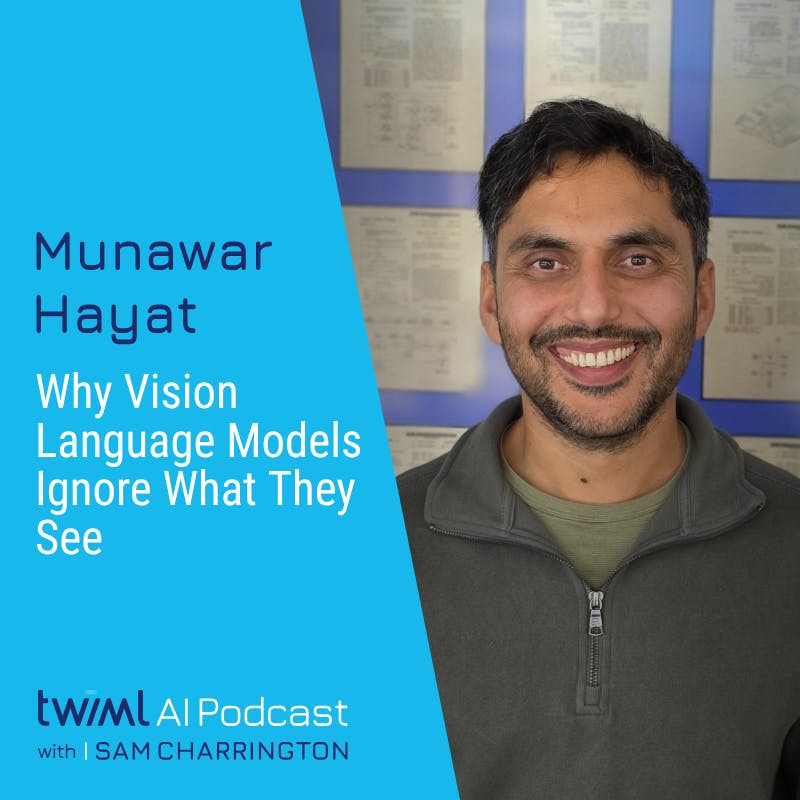

In this episode, we’re joined by Munawar Hayat, researcher at Qualcomm AI Research, to discuss a series of papers presented at NeurIPS 2025 focusing on multimodal and generative AI. We dive into the persistent challenge of object hallucination in Vision-Language Models (VLMs), why models often discard visual information in favor of pre-trained language priors, and how his team used attention-guided alignment to enforce better visual grounding. We also explore a novel approach to generalized contrastive learning designed to solve complex, composed retrieval tasks—such as searching via combined text and image queries—without increasing inference costs. Finally, we cover the difficulties generative models face when rendering multiple human subjects, and the new "MultiHuman Testbench" his team created to measure and mitigate issues like identity leakage and attribute blending. Throughout the discussion, we examine how these innovations align with the need for efficient, on-device AI deployment. The complete show notes for this episode can be found at https://twimlai.com/go/758.


In this episode, Zain Asgar, co-founder and CEO of Gimlet Labs, joins us to discuss the heterogeneous AI inference across diverse hardware. Zain argues that the current industry standard of running all AI workloads on high-end GPUs is unsustainable for agents, which consume significantly more tokens than traditional LLM applications. We explore Gimlet’s approach to heterogeneous inference, which involves disaggregating workloads across a mix of hardware—from H100s to older GPUs and CPUs—to optimize unit economics without sacrificing performance. We dive into their "three-layer cake" architecture: workload disaggregation, a compilation layer that maps models to specific hardware targets, and a novel system that uses LLMs to autonomously rewrite and optimize compute kernels. Finally, we discuss the complexities of networking in heterogeneous environments, the trade-offs between numerical precision and application accuracy, and the future of hardware-aware scheduling. The complete show notes for this episode can be found at https://twimlai.com/go/757.
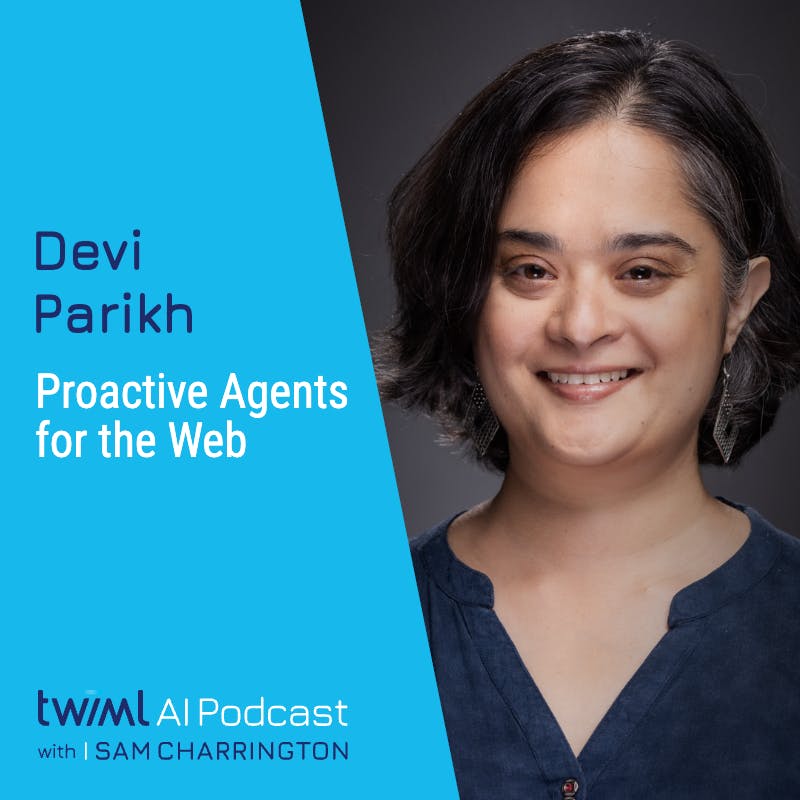

Today, we're joined by Devi Parikh, co-founder and co-CEO of Yutori, to discuss browser use models and a future where we interact with the web through proactive, autonomous agents. We explore the technical challenges of creating reliable web agents, the advantages of visually-grounded models that operate on screenshots rather than the browser’s more brittle document object model, or DOM, and why this counterintuitive choice has proven far more robust and generalizable for handling complex web interfaces. Devi also shares insights into Yutori’s training pipeline, which has evolved from supervised fine-tuning to include rejection sampling and reinforcement learning. Finally, we discuss how Yutori’s “Scouts” agents orchestrate multiple tools and sub-agents to handle complex queries, the importance of background, "ambient" operation for these systems, and what the path looks like from simple monitoring to full task automation on the web. The complete show notes for this episode can be found at https://twimlai.com/go/756.


Today, we're joined by Robin Braun, VP of AI business development for hybrid cloud at HPE, and Luke Norris, co-founder and CEO of Kamiwaza, to discuss how AI systems can be used to automate complex workflows and unlock value from legacy enterprise data. Robin and Luke detail high-impact use cases from HPE and Kamiwaza’s collaboration on an “Agentic Smart City” project for Vail, Colorado, including remediation and automation of website accessibility for 508 compliance, digitization and understanding of deed restrictions, and combining contextual information with camera feeds for fire detection and risk assessment. Additionally, we discuss the role of private cloud infrastructure in overcoming challenges like cost, data privacy, and compliance. Robin and Luke also share their lessons learned, including the importance of fresh data, and the value of a "mud puddle by mud puddle" approach in achieving practical AI wins. The complete show notes for this episode can be found at https://twimlai.com/go/755.


In this episode, Carina Hong, founder and CEO of Axiom, joins us to discuss her work building an "AI Mathematician." Carina explains why this is a pivotal moment for AI in mathematics, citing a convergence of three key areas: the advanced reasoning capabilities of modern LLMs, the rise of formal proof languages like Lean, and breakthroughs in code generation. We explore the core technical challenges, including the massive data gap between general-purpose code and formal math code, and the difficult problem of "autoformalization," or translating natural language proofs into a machine-verifiable format. Carina also shares Axiom's vision for a self-improving system that uses a self-play loop of conjecturing and proving to discover new mathematical knowledge. Finally, we discuss the broader applications of this technology in areas like formal verification for high-stakes software and hardware. The complete show notes for this episode can be found at https://twimlai.com/go/754.


In this episode, Hung Bui, Technology Vice President at Qualcomm, joins us to explore the latest high-efficiency techniques for running generative AI, particularly diffusion models, on-device. We dive deep into the technical challenges of deploying these models, which are powerful but computationally expensive due to their iterative sampling process. Hung details his team's work on SwiftBrush and SwiftEdit, which enable high-quality text-to-image generation and editing in a single inference step. He explains their novel distillation framework, where a multi-step teacher model guides the training of an efficient, single-step student model. We explore the architecture and training, including the use of a secondary 'coach' network that aligns the student's denoising function with the teacher's, allowing the model to bypass the iterative process entirely. Finally, we discuss how these efficiency breakthroughs pave the way for personalized on-device agents and the challenges of running reasoning models with techniques like inference-time scaling under a fixed compute budget. The complete show notes for this episode can be found at https://twimlai.com/go/753.


Today, we're joined by Alexandre Pesant, AI lead at Lovable, who joins us to discuss the evolution and practice of vibe coding. Alex shares his take on how AI is enabling a shift in software development from typing characters to expressing intent, creating a new layer of abstraction similar to how high-level code compiles to machine code. We explore the current capabilities and limitations of coding agents, the importance of context engineering, and the practices that separate successful vibe coders from frustrated ones. Alex also shares Lovable’s technical journey, from an early, complex agent architecture that failed, to a simpler workflow-based system, and back again to an agentic approach as foundation models improved. He also details the company's massive scaling challenges—like accidentally taking down GitHub—and makes the case for why robust evaluations and more expressive user interfaces are the most critical components for AI-native development tools to succeed in the near future. The complete show notes for this episode can be found at https://twimlai.com/go/752.
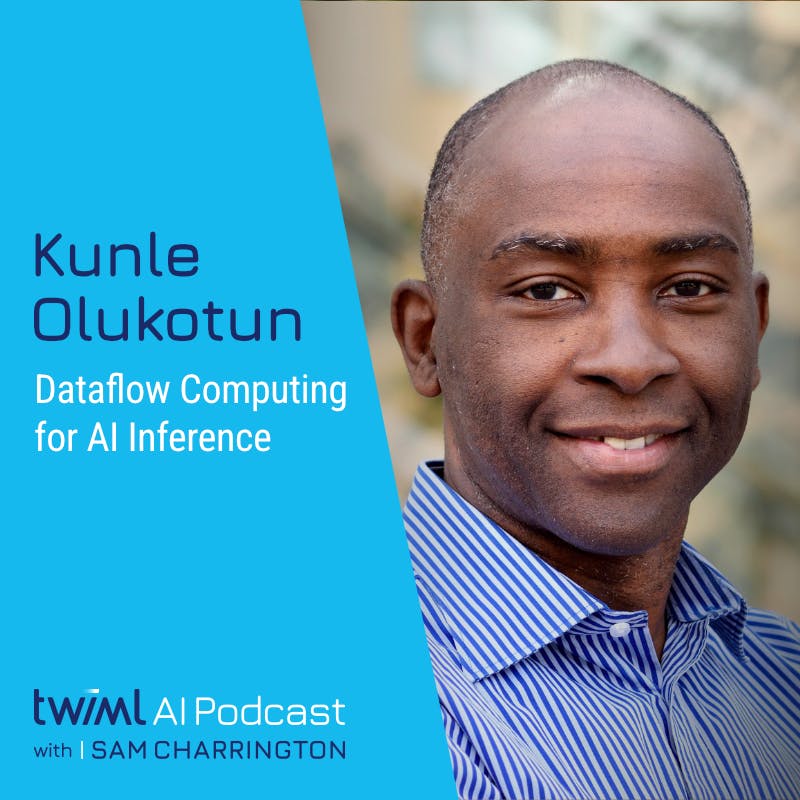

In this episode, we're joined by Kunle Olukotun, professor of electrical engineering and computer science at Stanford University and co-founder and chief technologist at Sambanova Systems, to discuss reconfigurable dataflow architectures for AI inference. Kunle explains the core idea of building computers that are dynamically configured to match the dataflow graph of an AI model, moving beyond the traditional instruction-fetch paradigm of CPUs and GPUs. We explore how this architecture is well-suited for LLM inference, reducing memory bandwidth bottlenecks and improving performance. Kunle reviews how this system also enables efficient multi-model serving and agentic workflows through its large, tiered memory and fast model-switching capabilities. Finally, we discuss his research into future dynamic reconfigurable architectures, and the use of AI agents to build compilers for new hardware. The complete show notes for this episode can be found at https://twimlai.com/go/751.


Today, we're joined by Jacob Buckman, co-founder and CEO of Manifest AI to discuss achieving long context in transformers. We discuss the bottlenecks of scaling context length and recent techniques to overcome them, including windowed attention, grouped query attention, and latent space attention. We explore the idea of weight-state balance and the weight-state FLOP ratio as a way of reasoning about the optimality of compute architectures, and we dig into the Power Retention architecture, which blends the parallelization of attention with the linear scaling of recurrence and promises speedups of >10x during training and >100x during inference. We review Manifest AI’s recent open source projects as well: Vidrial—a custom CUDA framework for building highly optimized GPU kernels in Python, and PowerCoder—a 3B-parameter coding model fine-tuned from StarCoder to use power retention. Our chat also covers the use of metrics like in-context learning curves and negative log likelihood to measure context utility, the implications of scaling laws, and the future of long context lengths in AI applications. The complete show notes for this episode can be found at https://twimlai.com/go/750.


In this episode, Illia Polosukhin, a co-author of the seminal "Attention Is All You Need" paper and co-founder of Near AI, joins us to discuss his vision for building private, decentralized, and user-owned AI. Illia shares his unique journey from developing the Transformer architecture at Google to building the NEAR Protocol blockchain to solve global payment challenges, and now applying those decentralized principles back to AI. We explore how Near AI is creating a decentralized cloud that leverages confidential computing, secure enclaves, and the blockchain to protect both user data and proprietary model weights. Illia also shares his three-part approach to fostering trust: open model training to eliminate hidden biases and "sleeper agents," verifiability of inference to ensure the model runs as intended, and formal verification at the invocation layer to enforce composable guarantees on AI agent actions. Finally, Illia shares his perspective on the future of open research, the role of tokenized incentive models, and the need for formal verification in building compliance and user trust. The complete show notes for this episode can be found at https://twimlai.com/go/749.
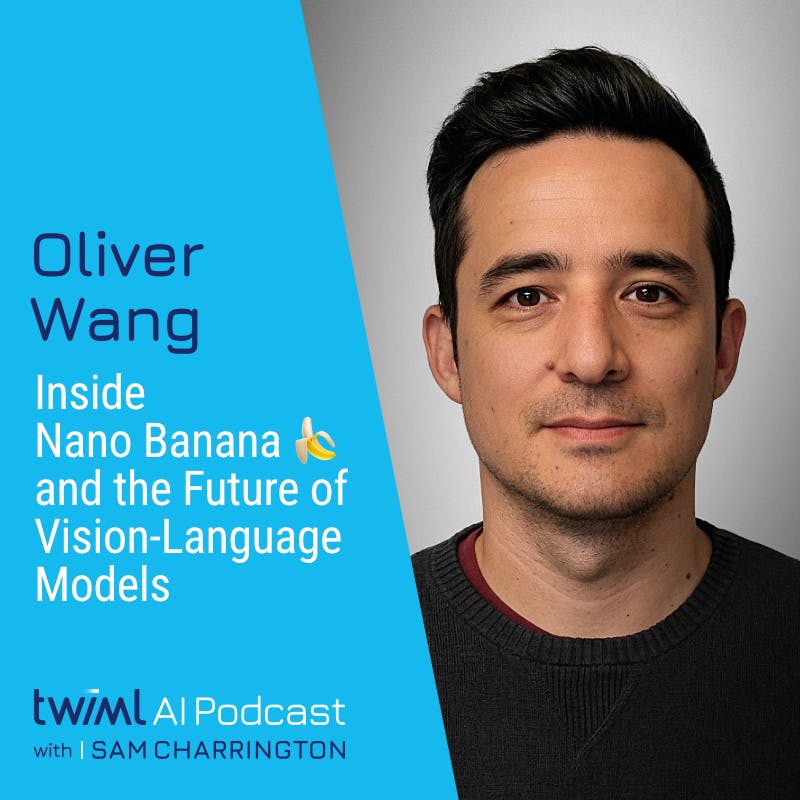

Today, we’re joined by Oliver Wang, principal scientist at Google DeepMind and tech lead for Gemini 2.5 Flash Image—better known by its code name, “Nano Banana.” We dive into the development and capabilities of this newly released frontier vision-language model, beginning with the broader shift from specialized image generators to general-purpose multimodal agents that can use both visual and textual data for a variety of tasks. Oliver explains how Nano Banana can generate and iteratively edit images while maintaining consistency, and how its integration with Gemini’s world knowledge expands creative and practical use cases. We discuss the tension between aesthetics and accuracy, the relative maturity of image models compared to text-based LLMs, and scaling as a driver of progress. Oliver also shares surprising emergent behaviors, the challenges of evaluating vision-language models, and the risks of training on AI-generated data. Finally, we look ahead to interactive world models and VLMs that may one day “think” and “reason” in images. The complete show notes for this episode can be found at https://twimlai.com/go/748.
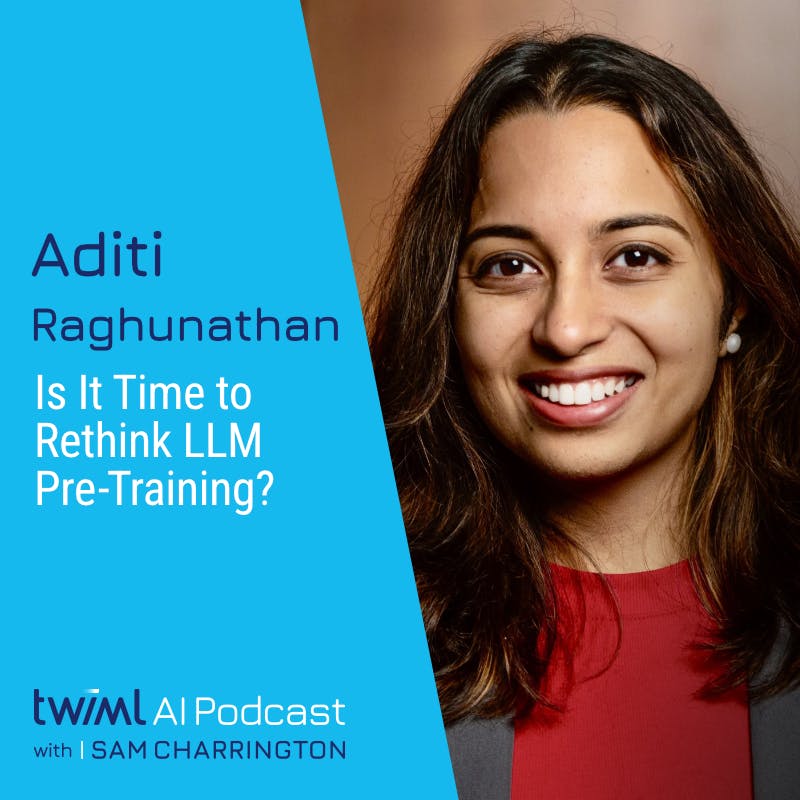

Today, we're joined by Aditi Raghunathan, assistant professor at Carnegie Mellon University, to discuss the limitations of LLMs and how we can build more adaptable and creative models. We dig into her ICML 2025 Outstanding Paper Award winner, “Roll the dice & look before you leap: Going beyond the creative limits of next-token prediction,” which examines why LLMs struggle with generating truly novel ideas. We dig into the "Roll the dice" approach, which encourages structured exploration by injecting randomness at the start of generation, and the "Look before you leap" concept, which trains models to take "leaps of thought" using alternative objectives to create more diverse and structured outputs. We also discuss Aditi’s papers exploring the counterintuitive phenomenon of "catastrophic overtraining," where training models on more data improves benchmark performance but degrades their ability to be fine-tuned for new tasks, and dig into her lab's work on creating more controllable and reliable models, including the concept of "memorization sinks," an architectural approach to isolate and enable the targeted unlearning of specific information. The complete show notes for this episode can be found at https://twimlai.com/go/747.


Today, we're joined by Animesh Koratana, founder and CEO of PlayerZero to discuss his team’s approach to making agentic and AI-assisted coding tools production-ready at scale. Animesh explains how rapid advances in AI-assisted coding have created an “asymmetry” where the speed of code output outpaces the maturity of processes for maintenance and support. We explore PlayerZero’s debugging and code verification platform, which uses code simulations to build a "memory bank" of past bugs and leverages an ensemble of LLMs and agents to proactively simulate and verify changes, predicting potential failures. Animesh also unpacks the underlying technology, including a semantic graph that analyzes code bases, ticketing systems, and telemetry to trace and reason through complex systems, test hypotheses, and apply reinforcement learning techniques to create an “immune system” for software. Finally, Animesh shares his perspective on the future of the software development lifecycle (SDLC), rethinking organizational workflows, and ensuring security as AI-driven tools continue to mature. The complete show notes for this episode can be found at https://twimlai.com/go/746.
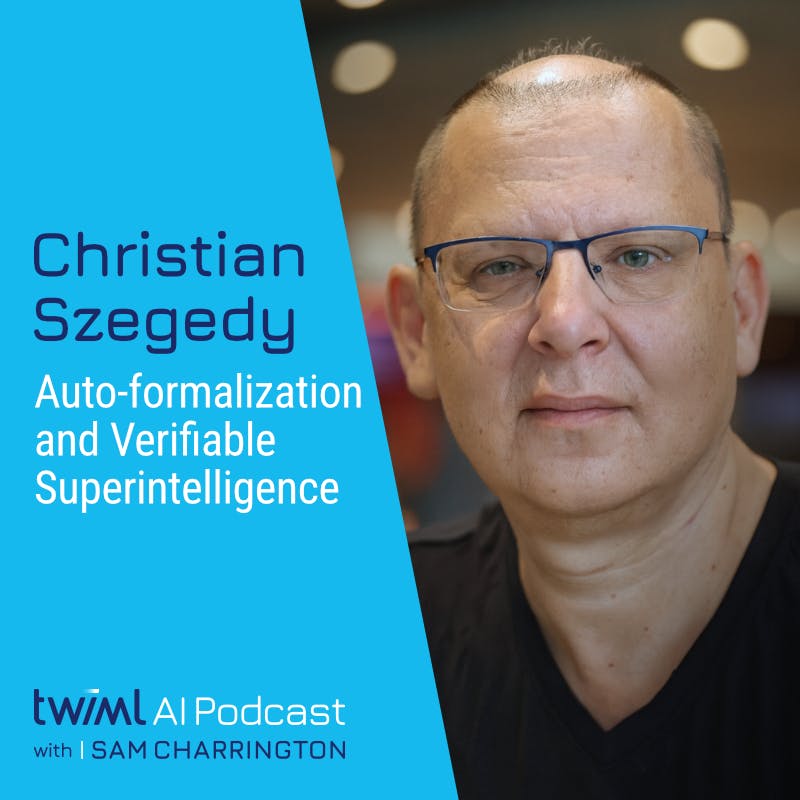

In this episode, Christian Szegedy, Chief Scientist at Morph Labs, joins us to discuss how the application of formal mathematics and reasoning enables the creation of more robust and safer AI systems. A pioneer behind concepts like the Inception architecture and adversarial examples, Christian now focuses on autoformalization—the AI-driven process of translating mathematical concepts from their human-readable form into rigorously formal, machine-verifiable logic. We explore the critical distinction between the informal reasoning of current LLMs, which can be prone to errors and subversion, and the provably correct reasoning enabled by formal systems. Christian outlines how this approach provides a robust path toward AI safety and also creates the high-quality, verifiable data needed to train models capable of surpassing human scientists in specialized domains. We also delve into his predictions for achieving this superintelligence and his ultimate vision for AI as a tool that helps humanity understand itself. The complete show notes for this episode can be found at https://twimlai.com/go/745.


Today, we're joined by Prince Canuma, an ML engineer and open-source developer focused on optimizing AI inference on Apple Silicon devices. Prince shares his journey to becoming one of the most prolific contributors to Apple’s MLX ecosystem, having published over 1,000 models and libraries that make open, multimodal AI accessible and performant on Apple devices. We explore his workflow for adapting new models in MLX, the trade-offs between the GPU and Neural Engine, and how optimization methods like pruning and quantization enhance performance. We also cover his work on "Fusion," a weight-space method for combining model behaviors without retraining, and his popular packages—MLX-Audio, MLX-Embeddings, and MLX-VLM—which streamline the use of MLX across different modalities. Finally, Prince introduces Marvis, a real-time speech-to-speech voice agent, and shares his vision for the future of AI, emphasizing the move towards "media models" that can handle multiple modalities, and more. The complete show notes for this episode can be found at https://twimlai.com/go/744.
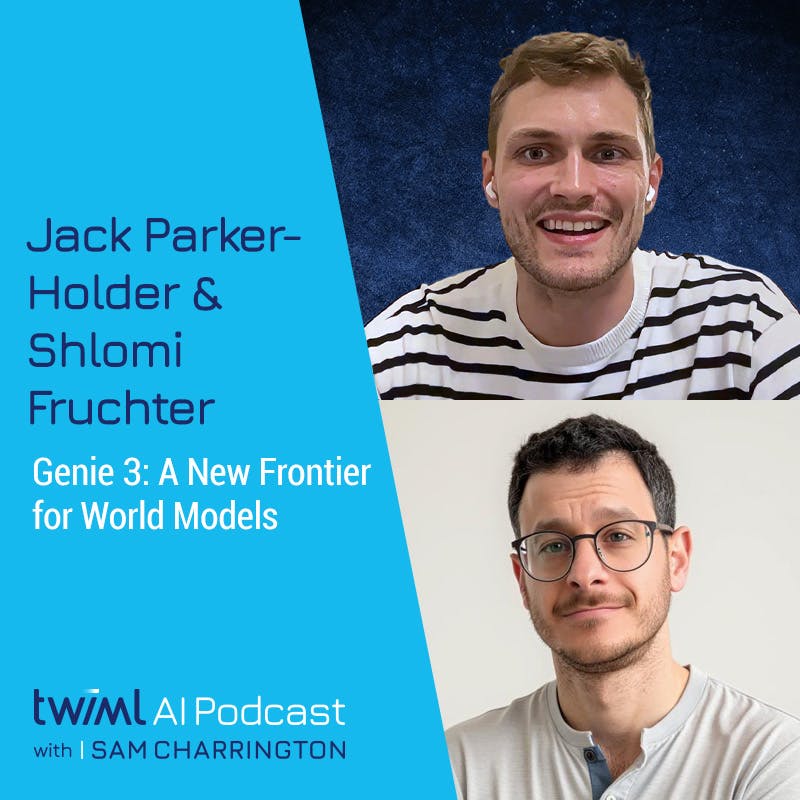

Today, we're joined by Jack Parker-Holder and Shlomi Fruchter, researchers at Google DeepMind, to discuss the recent release of Genie 3, a model capable of generating “playable” virtual worlds. We dig into the evolution of the Genie project and review the current model’s scaled-up capabilities, including creating real-time, interactive, and high-resolution environments. Jack and Shlomi share their perspectives on what defines a world model, the model's architecture, and key technical challenges and breakthroughs, including Genie 3’s visual memory and ability to handle “promptable world events.” Jack, Shlomi, and Sam share their favorite Genie 3 demos, and discuss its potential as a dynamic training environment for embodied AI agents. Finally, we will explore future directions for Genie research. The complete show notes for this episode can be found at https://twimlai.com/go/743.


In this episode, we're joined by Lin Qiao, CEO and co-founder of Fireworks AI. Drawing on key lessons from her time building PyTorch, Lin shares her perspective on the modern generative AI development lifecycle. She explains why aligning training and inference systems is essential for creating a seamless, fast-moving production pipeline, preventing the friction that often stalls deployment. We explore the strategic shift from treating models as commodities to viewing them as core product assets. Lin details how post-training methods, like reinforcement fine-tuning (RFT), allow teams to leverage their own proprietary data to continuously improve these assets. Lin also breaks down the complex challenge of what she calls "3D optimization"—balancing cost, latency, and quality—and emphasizes the role of clear evaluation criteria to guide this process, moving beyond unreliable methods like "vibe checking." Finally, we discuss the path toward the future of AI development: designing a closed-loop system for automated model improvement, a vision made more attainable by the exciting convergence of open and closed-source model capabilities. The complete show notes for this episode can be found at https://twimlai.com/go/742.
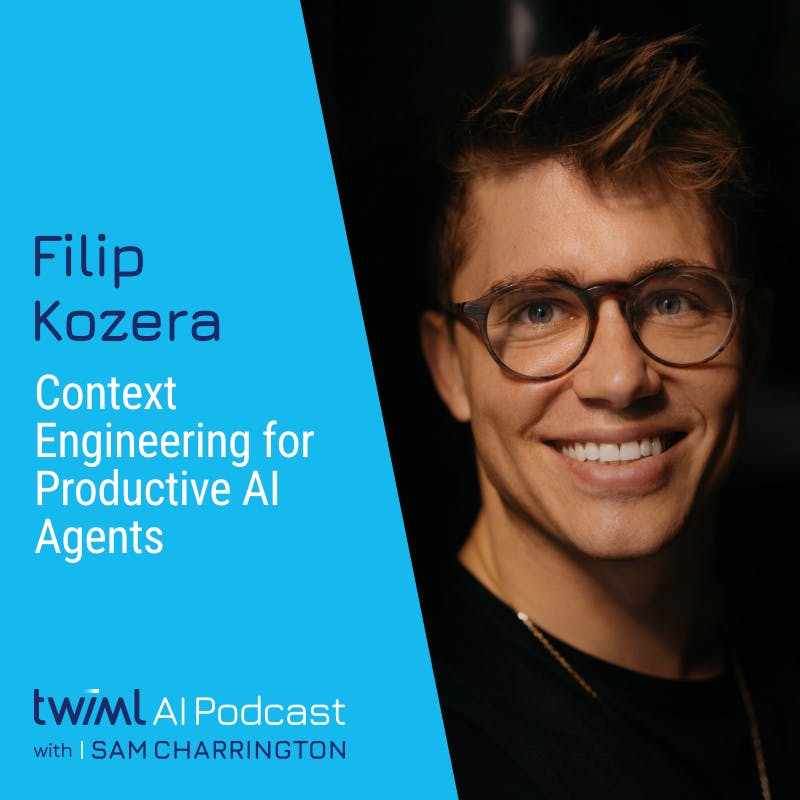

In this episode, Filip Kozera, founder and CEO of Wordware, explains his approach to building agentic workflows where natural language serves as the new programming interface. Filip breaks down the architecture of these "background agents," explaining how they use a reflection loop and tool-calling to execute complex tasks. He discusses the current limitations of agent protocols like MCPs and how developers can extend them to handle the required context and authority. The conversation challenges the idea that more powerful models lead to more autonomous agents, arguing instead for "graceful recovery" systems that proactively bring humans into the loop when the agent "knows what it doesn't know." We also get into the "application layer" fight, exploring how SaaS platforms are creating data silos and what this means for the future of interoperable AI agents. Filip also shares his vision for the "word artisan"—the non-technical user who can now build and manage a fleet of AI agents, fundamentally changing the nature of knowledge work. The complete show notes for this episode can be found at https://twimlai.com/go/741.
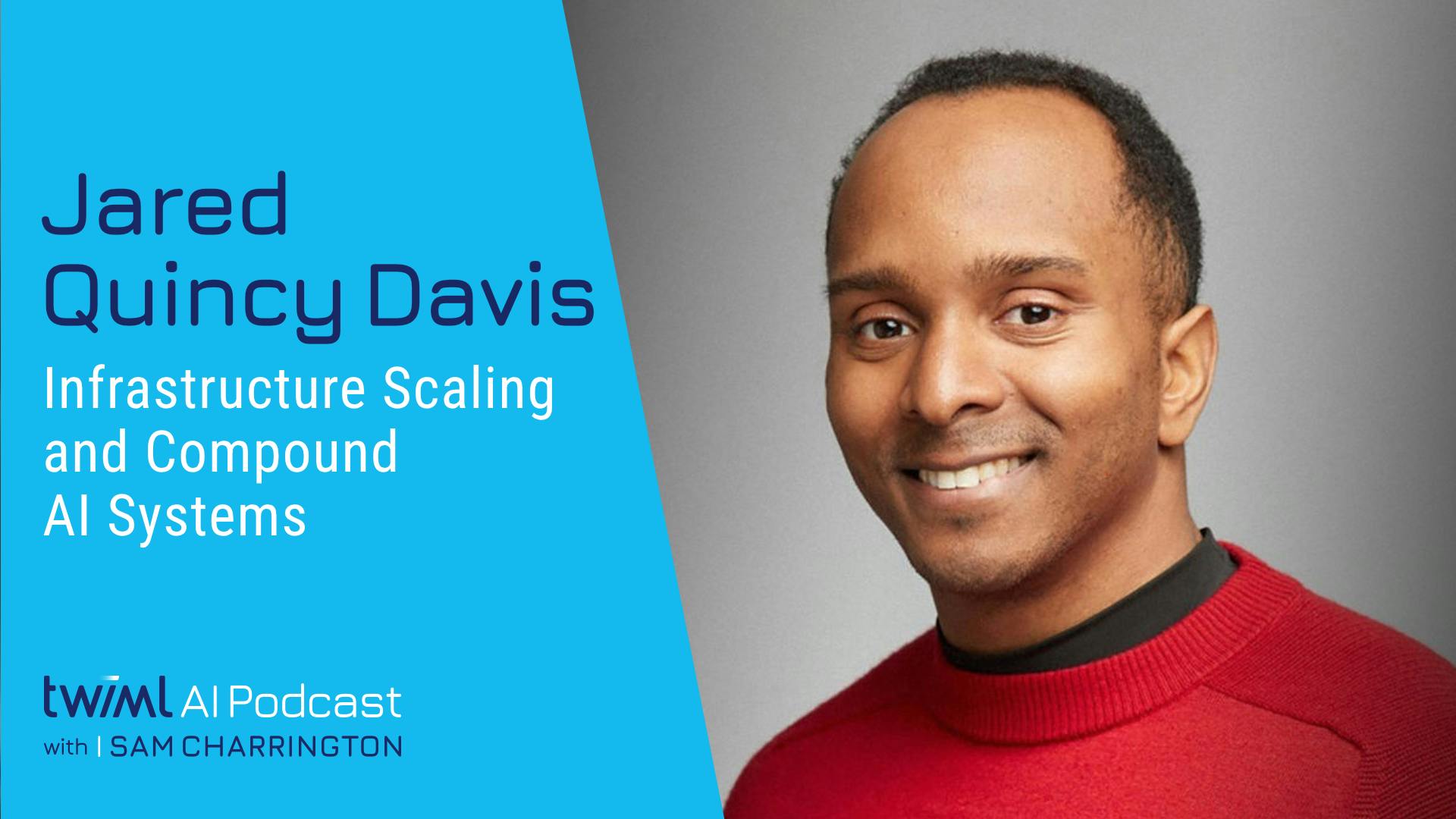

In this episode, Jared Quincy Davis, founder and CEO at Foundry, introduces the concept of "compound AI systems," which allows users to create powerful, efficient applications by composing multiple, often diverse, AI models and services. We discuss how these "networks of networks" can push the Pareto frontier, delivering results that are simultaneously faster, more accurate, and even cheaper than single-model approaches. Using examples like "laconic decoding," Jared explains the practical techniques for building these systems and the underlying principles of inference-time scaling. The conversation also delves into the critical role of co-design, where the evolution of AI algorithms and the underlying cloud infrastructure are deeply intertwined, shaping the future of agentic AI and the compute landscape. The complete show notes for this episode can be found at https://twimlai.com/go/740.


In this episode, Kwindla Kramer, co-founder and CEO of Daily and creator of the open source Pipecat framework, joins us to discuss the architecture and challenges of building real-time, production-ready conversational voice AI. Kwin breaks down the full stack for voice agents—from the models and APIs to the critical orchestration layer that manages the complexities of multi-turn conversations. We explore why many production systems favor a modular, multi-model approach over the end-to-end models demonstrated by large AI labs, and how this impacts everything from latency and cost to observability and evaluation. Kwin also digs into the core challenges of interruption handling, turn-taking, and creating truly natural conversational dynamics, and how to overcome them. We discuss use cases, thoughts on where the technology is headed, the move toward hybrid edge-cloud pipelines, and the exciting future of real-time video avatars, and much more. The complete show notes for this episode can be found at https://twimlai.com/go/739.
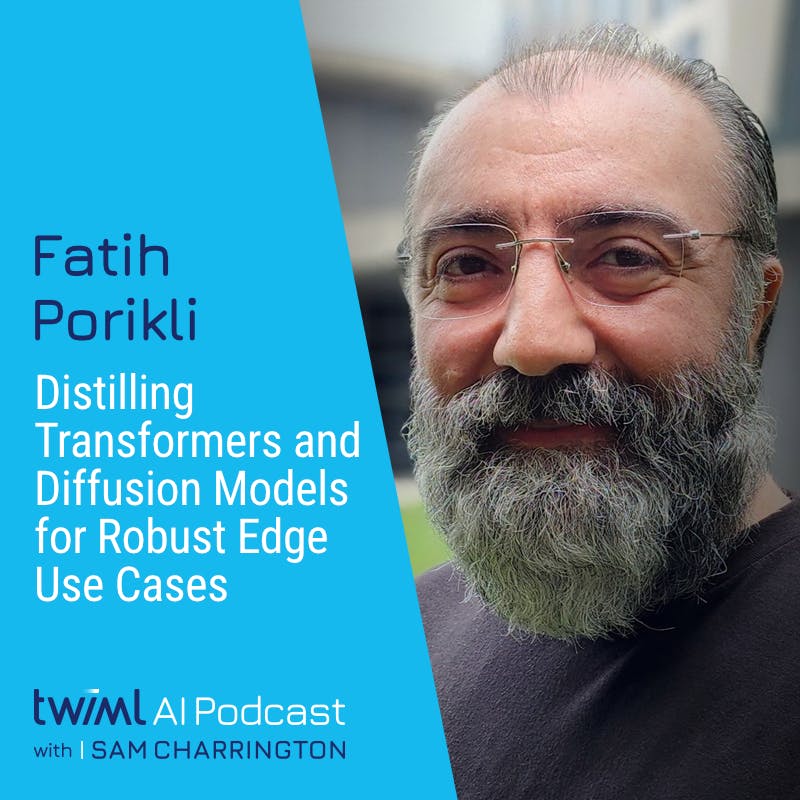

Today, we're joined by Fatih Porikli, senior director of technology at Qualcomm AI Research for an in-depth look at several of Qualcomm's accepted papers and demos featured at this year’s CVPR conference. We start with “DiMA: Distilling Multi-modal Large Language Models for Autonomous Driving,” an end-to-end autonomous driving system that incorporates distilling large language models for structured scene understanding and safe planning motion in critical "long-tail" scenarios. We explore how DiMA utilizes LLMs' world knowledge and efficient transformer-based models to significantly reduce collision rates and trajectory errors. We then discuss “SharpDepth: Sharpening Metric Depth Predictions Using Diffusion Distillation,” a diffusion-distilled approach that combines generative models with metric depth estimation to produce sharp, accurate monocular depth maps. Additionally, Fatih also shares a look at Qualcomm’s on-device demos, including text-to-3D mesh generation, real-time image-to-video and video-to-video generation, and a multi-modal visual question-answering assistant. The complete show notes for this episode can be found at https://twimlai.com/go/738.
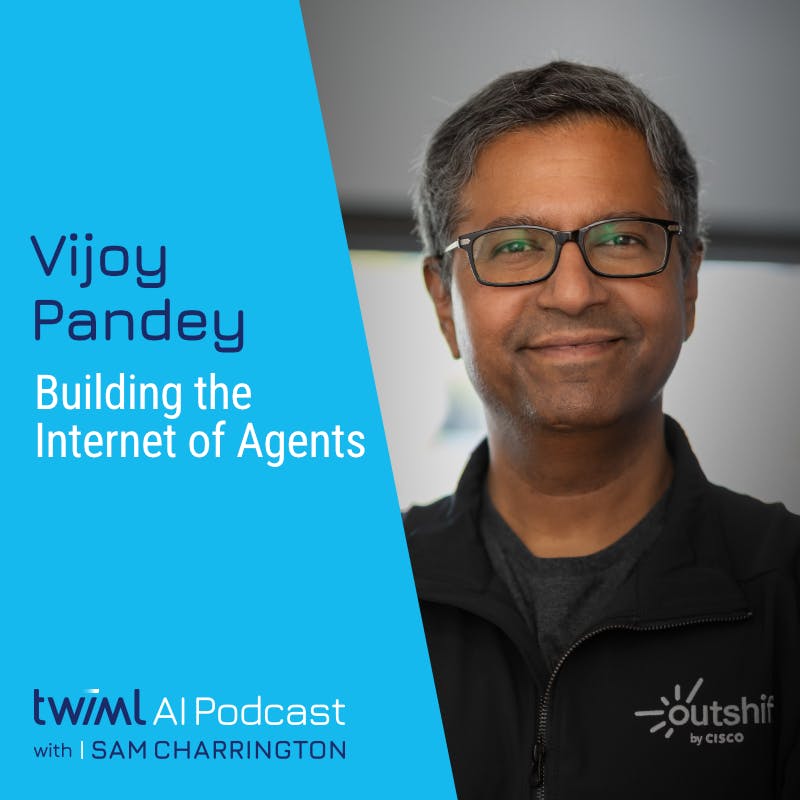

Today, we're joined by Vijoy Pandey, SVP and general manager at Outshift by Cisco to discuss a foundational challenge for the enterprise: how do we make specialized agents from different vendors collaborate effectively? As companies like Salesforce, Workday, and Microsoft all develop their own agentic systems, integrating them creates a complex, probabilistic, and noisy environment, a stark contrast to the deterministic APIs of the past. Vijoy introduces Cisco's vision for an "Internet of Agents," a platform to manage this new reality, and its open-source implementation, AGNTCY. We explore the four phases of agent collaboration—discovery, composition, deployment, and evaluation—and dive deep into the communication stack, from syntactic protocols like A2A, ACP, and MCP to the deeper semantic challenges of creating a shared understanding between agents. Vijoy also unveils SLIM (Secure Low-Latency Interactive Messaging), a novel transport layer designed to make agent-to-agent communication quantum-safe, real-time, and efficient for multi-modal workloads. The complete show notes for this episode can be found at https://twimlai.com/go/737.


Today, we're joined by Vijoy Pandey, SVP and general manager at Outshift by Cisco to discuss a foundational challenge for the enterprise: how do we make specialized agents from different vendors collaborate effectively? As companies like Salesforce, Workday, and Microsoft all develop their own agentic systems, integrating them creates a complex, probabilistic, and noisy environment, a stark contrast to the deterministic APIs of the past. Vijoy introduces Cisco's vision for an "Internet of Agents," a platform to manage this new reality, and its open-source implementation, AGNTCY. We explore the four phases of agent collaboration—discovery, composition, deployment, and evaluation—and dive deep into the communication stack, from syntactic protocols like A2A, ACP, and MCP to the deeper semantic challenges of creating a shared understanding between agents. Vijoy also unveils SLIM (Secure Low-Latency Interactive Messaging), a novel transport layer designed to make agent-to-agent communication quantum-safe, real-time, and efficient for multi-modal workloads. The complete show notes for this episode can be found at https://twimlai.com/go/737.


Today, we're joined by Ben Wellington, deputy head of feature forecasting at Two Sigma. We dig into the team’s end-to-end approach to leveraging AI in equities feature forecasting, covering how they identify and create features, collect and quantify historical data, and build predictive models to forecast market behavior and asset prices for trading and investment. We explore the firm's platform-centric approach to managing an extensive portfolio of features and models, the impact of multimodal LLMs on accelerating the process of extracting novel features, the importance of strict data timestamping to prevent temporal leakage, and the way they consider build vs. buy decisions in a rapidly evolving landscape. Lastly, Ben also shares insights on leveraging open-source models and the future of agentic AI in quantitative finance. The complete show notes for this episode can be found at https://twimlai.com/go/736.


Today, we're joined by Jason Corso, co-founder of Voxel51 and professor at the University of Michigan, to explore automated labeling in computer vision. Jason introduces FiftyOne, an open-source platform for visualizing datasets, analyzing models, and improving data quality. We focus on Voxel51’s recent research report, “Zero-shot auto-labeling rivals human performance,” which demonstrates how zero-shot auto-labeling with foundation models can yield to significant cost and time savings compared to traditional human annotation. Jason explains how auto-labels, despite being "noisier" at lower confidence thresholds, can lead to better downstream model performance. We also cover Voxel51's "verified auto-labeling" approach, which utilizes a "stoplight" QA workflow (green, yellow, red light) to minimize human review. Finally, we discuss the challenges of handling decision boundary uncertainty and out-of-domain classes, the differences between synthetic data generation in vision and language domains, and the potential of agentic labeling. The complete show notes for this episode can be found at https://twimlai.com/go/735.


Today, we're joined by Charles Martin, founder of Calculation Consulting, to discuss Weight Watcher, an open-source tool for analyzing and improving Deep Neural Networks (DNNs) based on principles from theoretical physics. We explore the foundations of the Heavy-Tailed Self-Regularization (HTSR) theory that underpins it, which combines random matrix theory and renormalization group ideas to uncover deep insights about model training dynamics. Charles walks us through WeightWatcher’s ability to detect three distinct learning phases—underfitting, grokking, and generalization collapse—and how its signature “layer quality” metric reveals whether individual layers are underfit, overfit, or optimally tuned. Additionally, we dig into the complexities involved in fine-tuning models, the surprising correlation between model optimality and hallucination, the often-underestimated challenges of search relevance, and their implications for RAG. Finally, Charles shares his insights into real-world applications of generative AI and his lessons learned from working in the field. The complete show notes for this episode can be found at https://twimlai.com/go/734.


Today, I’m excited to share a special crossover edition of the podcast recorded live from Google I/O 2025! In this episode, I join Shawn Wang aka Swyx from the Latent Space Podcast, to interview Logan Kilpatrick and Shrestha Basu Mallick, PMs at Google DeepMind working on AI Studio and the Gemini API, along with Kwindla Kramer, CEO of Daily and creator of the Pipecat open source project. We cover all the highlights from the event, including enhancements to the Gemini models like thinking budgets and thought summaries, native audio output for expressive voice AI, and the new URL Context tool for research agents. The discussion also digs into the Gemini Live API, covering its architecture, the challenges of building real-time voice applications (such as latency and voice activity detection), and new features like proactive audio and asynchronous function calling. Finally, don’t miss our guests’ wish lists for next year’s I/O!